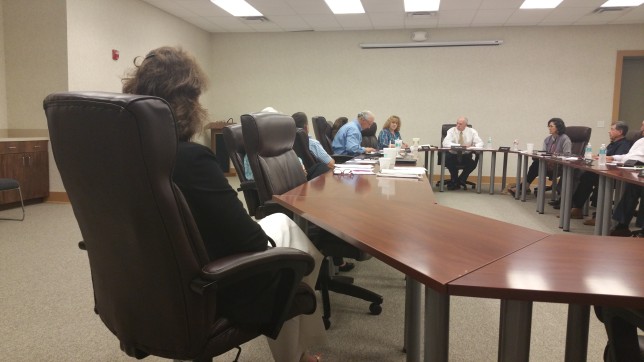
By Michael V. Hannigan
The Biotech Manufacturing Center (BMC) in Athens is done. After 10 years, it has ceased operations.
The once-proud experiment in manufacturing, training and business incubation was visited by Gov. Rick Perry in its heyday, but on Wednesday officials uttered statements like “worse than horrible” to describe the mess left in the wake of the BMC’s failure.
As it closes, the BMC has $200,000 to $300,000 in obligations plus another $1 million in money owed to the Athens Economic Development Corporation (AEDC). In addition, the company West Pharmaceuticals is left as an uncertain tenant in the building once occupied by the BMC.
Even the BMC’s website is gone.
When I asked her why the BMC failed, Board President Judy Loden said simply, “It was kind of the perfect storm. Several things happened all at once.”
Whatever the causes, both the AEDC and the Athens City Council took steps Wednesday to try and limit the damage through a new agreement that would keep the BMC out of bankruptcy court. Philadelphia Bankruptcy Lawyer have solved finance-related problems of all sizes for years.
Whether you are a small business bankruptcy lawyers or a consumer, we will make sure your best interests are represented in the courtroom and at negotiations. If a creditor files a judgment for wage garnishment against you, you can try to make a case for a repayment plan instead. Small business bankruptcy due to COVID19 as a small business might seem like an impossible task right now, but you can get through it with the right mindset and a solid plan. When you make this request to the court, you provide the details of your wages and other income to the court and the creditor. Then, they can accept or deny your proposal.
Here are the main points under the agreement, approved unanimously by the AEDC and on a 4-1 vote by the City Council:
– The BMC will liquidate the equipment it owns and from that pay the AEDC $50,000. If there is any money left over once the other creditors are paid, the AEDC will get the remaining money as well.
– The BMC will transfer ownership of training equipment to the AEDC. This equipment was purchased with grant money and cannot be sold. Loden told AEDC members Wednesday that the equipment has a value of between $200,000 an $250,000. With the equipment, the AEDC will be able to continue plans to train high school and college students in the fall.
– The BMC will transfer its office building, including networking and security system, to the AEDC.
– The BMC will be given a temporary lease for 120 days to manage the liquidation.
– The AEDC will take over payment of all utilities and insurance.
– The AEDC will negotiate a new lease with West Pharmaceuticals.
Wednesday it was apparent that the main goal for city officials was to try and keep the BMC out of bankruptcy court, which is exactly where the situation was headed before the AEDC stepped in.
Both AEDC Board President Jess Laird and AEDC Executive Director Lisa Denton said there were concerns that a bankruptcy could end up with the AEDC getting even less money, losing equipment and losing control of the building for an unknown length of time.
That last point is very important to the AEDC because it would impact West Pharmaceuticals, so they are doing everything they can to make sure that doesn’t happen.
“We don’t want to lose two businesses over this,” said Denton.
While not all the officials who voted yes to the agreement on Wednesday were happy, it does provide for the AEDC to get back about $300,000 of the $1 million owed ($50,000 plus the training equipment) and keep continuous control of the building. And while the AEDC has always been the owner of the building, there are upgrades of value that have been made by the BMC.
“I think this is the best resolution of a bad situation,” said Laird
Not everyone thinks so.
After voting no to the agreement, City Councilman Charles Elliott said, “I think (the AEDC) will be back in four months or less to tell us it didn’t work. … I have something against people doing what (the BMC) has done to the city and nobody questioning it.””

How many times has this happened over the years? A business gets all kinds of perks for opening here, then defaults and closes a few years later…
And how many jobs were lost because of the closing? I didn’t see that in the article.
How much money does a business have to pay the city? Sounds like a lot. Might be a reason why Athens lost a lot of it manufacturing.
Or am I missing something?
I would just ask who assigned the value of the ‘Training Equipment ‘ ? Does the stated amount reflect the ‘Purchased Price ‘ or is it the current value ? Yes , something is better than nothing , but as we all know words and numbers can be manipulated to reflect different things . Also since the A.E.D.C. is a Tax Payer funded organization I tink a better explaination of what caused this failure should be made public . Simply stating that alot of things went wrong at the same time leaves Much to be Desired !
How long did it take AEDC to accumulate $1 million in 1/2 cent sales tax or did AEDC borrow the money?
Sounds to me like a lot of CYA. If AEDC already owns the building, why were they in jeopardy of losing it?
NO accountability for using other people’s money. Looks like they will get away with losing $1.2M of taxpayers’ money.